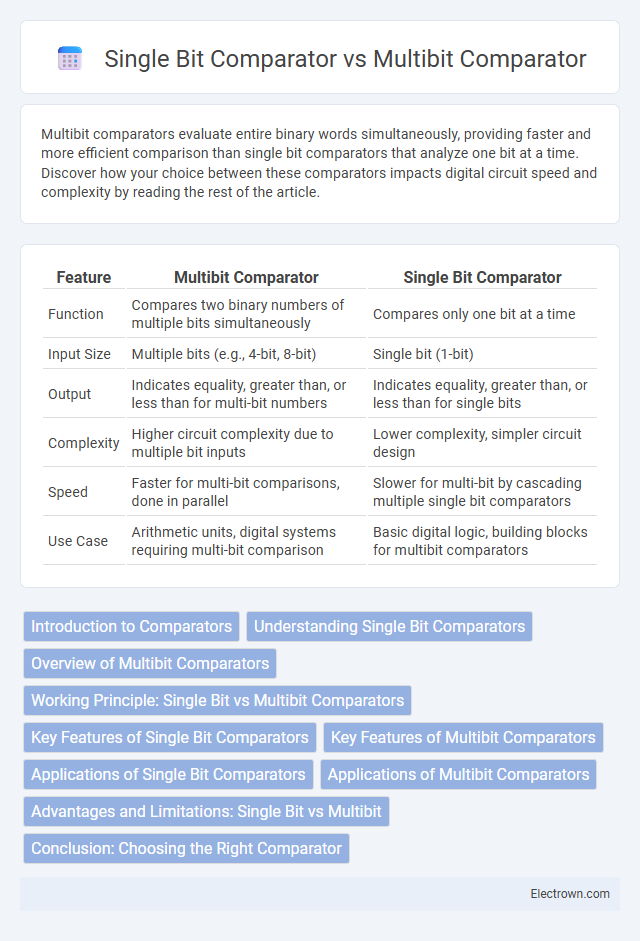Multibit comparators evaluate entire binary words simultaneously, providing faster and more efficient comparison than single bit comparators that analyze one bit at a time. Discover how your choice between these comparators impacts digital circuit speed and complexity by reading the rest of the article.
Table of Comparison
| Feature | Multibit Comparator | Single Bit Comparator |
|---|---|---|
| Function | Compares two binary numbers of multiple bits simultaneously | Compares only one bit at a time |
| Input Size | Multiple bits (e.g., 4-bit, 8-bit) | Single bit (1-bit) |
| Output | Indicates equality, greater than, or less than for multi-bit numbers | Indicates equality, greater than, or less than for single bits |
| Complexity | Higher circuit complexity due to multiple bit inputs | Lower complexity, simpler circuit design |
| Speed | Faster for multi-bit comparisons, done in parallel | Slower for multi-bit by cascading multiple single bit comparators |
| Use Case | Arithmetic units, digital systems requiring multi-bit comparison | Basic digital logic, building blocks for multibit comparators |
Introduction to Comparators
Comparators are essential digital circuits used to compare two binary values and determine their relative magnitude. A single bit comparator compares one pair of bits, producing outputs to indicate equality, greater than, or less than conditions at the bit level. Multibit comparators extend this functionality to multiple bits simultaneously, enabling comparison of binary words for applications in arithmetic logic units, digital signal processing, and data sorting algorithms.
Understanding Single Bit Comparators
Single bit comparators are fundamental digital circuits designed to compare two single-bit binary inputs, producing outputs that indicate whether the inputs are equal, or if one is greater than the other. Their simplicity allows easy integration into more complex multibit comparators, where multiple single bit comparators are combined to evaluate binary numbers of greater length. Understanding the operation of single bit comparators is essential for designing efficient multibit comparators that accurately perform binary number comparisons in digital systems.
Overview of Multibit Comparators
Multibit comparators are digital circuits designed to compare binary numbers consisting of multiple bits simultaneously, enabling rapid evaluation of equality or magnitude between two binary values. Unlike single bit comparators, which only compare individual bits and require chaining for multiple bits, multibit comparators perform parallel comparison, significantly improving processing speed in digital systems. Your choice of a multibit comparator can enhance performance in applications requiring quick data comparison, such as arithmetic units and digital signal processing.
Working Principle: Single Bit vs Multibit Comparators
Single bit comparators operate by comparing two individual binary digits, outputting a simple equal, greater, or less signal for that specific bit. Multibit comparators extend this principle by simultaneously evaluating multiple bits in parallel, allowing your digital system to determine the relative magnitude of entire binary words in one operation. This parallel processing in multibit comparators significantly enhances speed and accuracy when handling complex binary number comparisons.
Key Features of Single Bit Comparators
Single bit comparators perform binary comparison between two single-bit inputs, producing outputs that indicate equality, greater-than, or less-than conditions. These comparators are fundamental in digital circuits, enabling basic decision-making at the bit level with minimal hardware complexity and high speed. Key features include simplicity, low power consumption, and the ability to serve as building blocks for more complex multibit comparators.
Key Features of Multibit Comparators
Multibit comparators evaluate multiple bits simultaneously, increasing speed and efficiency compared to single bit comparators that analyze one bit at a time. Key features of multibit comparators include parallel processing, reduced propagation delay, and enhanced performance in digital circuits, making them ideal for real-time applications where speed is critical. Your design can benefit from the compact architecture and scalability offered by multibit comparators in complex systems like CPUs and digital signal processors.
Applications of Single Bit Comparators
Single bit comparators are primarily used in digital circuits for basic equality checking and decision-making tasks, such as in arithmetic logic units (ALUs), multiplexers, and simple control circuits. Their simplicity makes them ideal for comparison operations in binary systems where only one bit's value needs to be evaluated. Your design can benefit from single bit comparators in applications requiring fast, low-complexity binary comparisons at the bit level.
Applications of Multibit Comparators
Multibit comparators are widely used in digital systems for applications requiring simultaneous comparison of multiple bits, such as in arithmetic logic units (ALUs), digital signal processing, and memory address decoding. These comparators enable faster decision-making by evaluating entire data words in parallel, improving efficiency in processors and communication systems. Their ability to provide equality, magnitude, and range detection makes them essential in sorting algorithms and digital control circuits.
Advantages and Limitations: Single Bit vs Multibit
Multibit comparators offer faster decision-making by evaluating multiple bits simultaneously, increasing processing speed in complex circuits, but they consume more power and require larger silicon area than single bit comparators. Single bit comparators are simpler, occupy less chip space, and are energy-efficient, making them ideal for low-power or area-constrained designs, yet they are slower when scaling to compare wider data words. Your choice depends on balancing speed requirements against power and area limitations, with multibit comparators excelling in high-speed applications and single bit comparators suiting simpler or resource-limited systems.
Conclusion: Choosing the Right Comparator
Selecting the right comparator depends on the complexity and speed requirements of your digital circuit. Multibit comparators efficiently compare entire binary words simultaneously, offering faster performance and reduced propagation delay compared to single bit comparators that compare bit by bit in sequence. Your choice should balance the need for speed, hardware complexity, and power consumption in designing digital systems.
Multibit Comparator vs Single Bit Comparator Infographic

 electrown.com
electrown.com